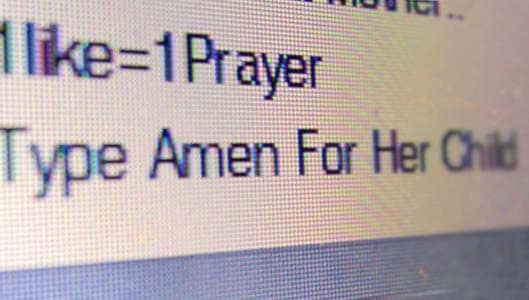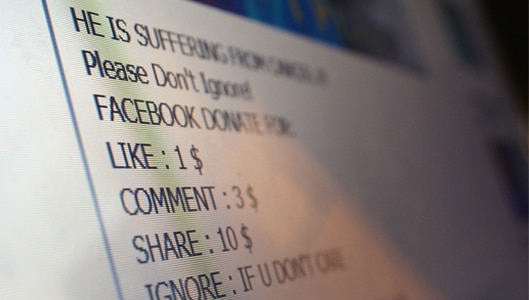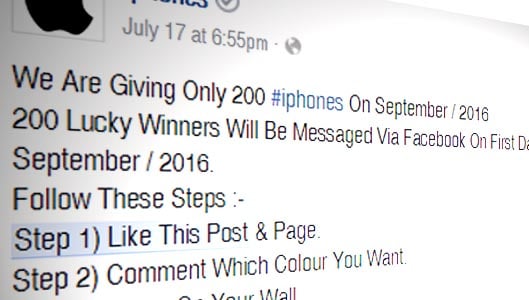5 Facebook posts you SHOULD NOT be sharing
We discuss 5 types of Facebook posts that users should avoid sharing with their friends and explain why.
On social networking sites like Facebook, we’re all eager to share content with our friends. After all, that’s what social media is for. To be social, right?
But there are plenty of people looking to exploit our trigger-happy sharing, often for their own financial gain.
For those not in the know, like-farming is the process where spammers post exploitative and deceptive posts to help their spammy pages accumulate followers. These followers can then be exposed to spam, online scams or the Facebook pages can be sold to spammy marketing companies.
Here we discuss 5 types of like-farming Facebook posts often utilised by spammers on Facebook to help their spammy Facebook pages accumulate thousands of followers.
Type AMEN/Prayer Request
Also known as the “share if you have a heart” variant.
Some of the best like-farming posts out there are the ones that encourage Facebook users to interact with them, and what better way to encourage that interaction than by pulling at the emotional heartstrings.
Cue the image of an abandoned pet or disabled child, along with the poignant plea to type “AMEN” or a statement asserting that a share equates to a prayer.
This popular permutation of like-farming has long proved to be one of the most popular. Facebook users can’t resist engaging in a little armchair activism to show they’re against cancer or animal mistreatment, or want to send out a little digital prayer for a child in hospital.
But of course those shares, comments and likes amount to very little in terms of real, tangible help, and in the meantime the spammers are watching the engagement on their exploitative posts rise, which they’ll do their best to turn into profit for themselves.
We discuss more about this type of emotional exploitation in our blog post here and here too.
Sponsored Content. Continued below...
1 Share = $1 donation
The notion that Facebook or any charity will condition medical treatment or donations based on how viral an image or post goes on the social networking website should be enough to dismiss this blatantly corrupt version of like-farming, but alas they remain one of them most successful permutations of like-farming we still see on the site today.
So no, no one conditions any sort of charity on how many likes, shares or comments a Facebook post receives. It’s just a way of luring people into interacting with a Facebook post, and is essentially just a variation of the “amen” brand of posts we discuss above.
Share to Win
Share this post and comment what colour you want, and win a brand new iPod? Or share this pic to get an unsealed PlayStation. Or airline tickets? Or even a Range Rover?
Not all promotions on Facebook are scams, but posts that demand you share them on your timeline probably are, if not for the simple reason than conditioning entry to a competition or giveaway based on sharing a post onto your Facebook timeline is against Facebook’s terms of service.
If in doubt, take a look at the page making the posts. Is it the official page relating to the specific brand, or a page that seems to just want people to like and share their posts?
We discuss these types of posts in more detail here.
Sponsored Content. Continued below...
Facebook are banning…
If you see a post on Facebook frantically urging you to share it “before Facebook takes it down” or because “Facebook finds it offensive” then the chances are pretty high that you’re looking at a like-farming post baiting you into sharing it.
How do we know? Because if Facebook were really removing that particular piece of content, it wouldn’t be on your newsfeed asking you to share it.
Again we discuss this in more detail here.
Comment and share to see what happens
What happens after you share this photo and comment “blue”? The answer – absolutely nothing. Other than you’ve just shared it on your timeline, and the spammers know that by the time this happens, most people won’t be bothered to remove it, thus free shares, likes and/or comments for the spammers on their Facebook post.
Remember, we all need to be responsible for the information we choose to share on social media. It is not only our own timeline we end up spamming, but the newsfeeds of our friends as well. For instant updates on all this nonsense out there on social media, follow our friendly, community Facebook page here.
Continued below...
Thanks for reading, we hope this article helped, but before you leave us for greener pastures, please help us out.
We're hoping to be totally ad-free by 2025 - after all, no one likes online adverts, and all they do is get in the way and slow everything down. But of course we still have fees and costs to pay, so please, please consider becoming a Facebook supporter! It costs only 0.99p (~$1.30) a month (you can stop at any time) and ensures we can still keep posting Cybersecurity themed content to help keep our communities safe and scam-free. You can subscribe here
Remember, we're active on social media - so follow us on Facebook, Bluesky, Instagram and X




